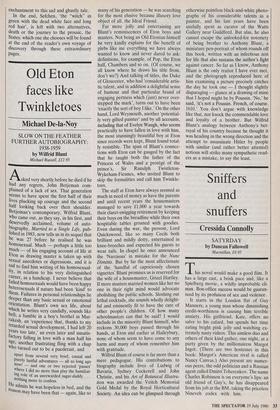Old Eton faces like Twinkletoes
Michael De-la-Noy
SLOW ON THE FEATHER FURTHER AUTOBIOGRAPHY: 1938-1959 by Wilfrid Blunt
Michael Russell, f12.95
Asked very shortly before he died if he had any regrets, John Betjeman com- plained of a lack of sex. That generation seems to have spent the first half of their lives plucking up courage and the second half looking back over their shoulder. Betjeman's contemporary, Wilfrid Blunt, who came out, as they say, in his first, and deservedly acclaimed, volume of auto- biography, Married to a Single Life, pub- lished in 1983, now tells us in its sequel that he was 27 before he realised he was homosexual. Much — perhaps a little too much — of his engaging account of life at Eton as drawing master is taken up with sexual anecdotes or digressions, and it is sad to find him writing of his homosexual- ity, in relation to his very distinguished career, as a handicap. I never believe that failed homosexuals would have been happy heterosexuals if nature had been 'kind' to them. Failures in personal relationships lie deeper than any basic sexual or emotional orientation. Blunt's own sex life, about which he writes very candidly, sounds like hell; a fumble in a boy's brothel in Mar- rakesh, an 'experience that, thanks to my retarded sexual development, I had left 20 years too late,' an even later and unsatis- factory falling in love with a man half his age, another frustrating fling with a chap who turned out to be a paederast, and
apart from several very brief, casual and purely lustful adventures — all so long ago now! — and one or two rejected 'passes' where I did no more than play the humiliat- ing role of an unrewarded sugar-daddy . . . nothing more to confess.
He admits he was hopeless in bed, and the reason may have been that — again, like so many of his generation — he was searching for the most elusive because illusory love object of all, the Ideal Friend.
Far more jolly and entertaining are Blunt's reminiscences of Eton boys and masters. Not being an Old Etonian himself he very kindly explains for the benefit of plebs like me everything we have always wanted to know and never dared to ask: definitions, for example, of Pop, the Eton half, Chambers and so on. (Of course, we all know where he draws his title from, don't we?) And talking of titles, the Duke of Gloucester, who had 'considerable artis- tic talent, and in addition a delightful sense of humour and that particular brand of engaging pertness which (just) never over- stepped the mark', turns out to have been `exactly the sort of boy I like.' On the other hand, Lord Weymouth, another 'potential- ly very gifted painter' and by all accounts, including that of Evelyn Waugh, who seems practically to have fallen in love with him, the most stunningly beautiful boy at Eton since records were kept, Blunt found total- ly resistible. The span of Blunt's connec- tions with Eton can be gauged by the fact that he taught both the father of the Princess of Wales and a protégé of the prince's, Sir Ranulph Twistleton- Wykeham-Fiennes, who invited Blunt to skip the formalities and call him Twinkle- toes.
The staff at Eton have always seemed as much in need of money as have the parents and until recent years the housemasters managed to save £1,000 a year towards their claret-swigging retirement by keeping their boys on the breadline while their own hospitable tables groaned with goodies. Even during the war, the provost, Lord Quickswood, like so many Cecils both brilliant and mildly dotty, entertained in knee-breeches and expected his guests to wear tails. In chapel he once announced the 'Narcissus' in mistake for the Nunc Dimittis. But by far the most affectionate of the 'handful of capriciously chosen vignettes' Blunt promises us is reserved for the wife of a housemaster, Grizel Hartley. If more masters married women like her no one in their right mind would advocate abolishing the public schools, Sloshing out lethal cocktails, she sounds wholly delight- ful and eminently fit to have the care of other people's children. Of how many schoolmasters can that be said? I would include in the minority Blunt himself, who reckons 30,000 boys passed through his hands, at Eton and earlier at Haileybury, none of whom seem to have come to any harm and many of whom remember him with gratitude. Wilfrid Blunt of course is far more than a mere pedagogue. His contributions to biography include lives of Ludwig of Bavaria, Sydney Cockerell and John Christie, and his Art of Botanical Illustra- tion was awarded the Veitch Memorial Gold Medal by the Royal Horticultural Society. An idea can be glimpsed through otherwise pointless black-and-white photo- graphs of his considerable talents as a painter, and his last years have been usefully spent as curator of the Watts Gallery near Guildford. But alas, he also cannot escape the unlooked-for notoriety of being brother to Anthony Blunt, a miniature pen-portrait of whom rounds off this book, written with an infectious zest for life that also sustains the author's fight against cancer. So far as I know, Anthony Blunt is the only traitor I have ever met, and the photograph reproduced here of him examining a picture precisely catches the day he took one — I thought slightly disparaging — glance at a drawing of mine that I hoped might be by Poussin. 'No,' he said, 'it's not a Poussin. French, of course. 1610.' You don't argue with knowledge like that, nor knock the commendable love and loyalty of a brother. But Wilfrid Blunt's analogy between Anthony's bet- rayal of his country because he thought it was heading in the wrong direction and the attempt to assassinate Hitler by people with similar (and rather better attested) notions will strike many sympathetic read- ers as a mistake, to say the least.


















































 Previous page
Previous page